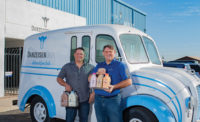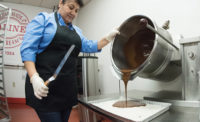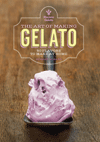KanPak is a leader in shelf-stable dairy solutions
The company produces an extensive line of aseptically processed dairy-based and nondairy products for a wide array of customers.










With no brands of its own gracing retail shelves or foodservice counters, KanPak US might not be a household name among U.S. consumers. But make no mistake: The company is a dairy processing powerhouse, coming in at No. 88 in Dairy Foods’ 2021 listing of the top 100 North American dairy processors (Dairy 100).
KanPak US is part of KanPak LLC, which got its start more than a half century ago when George Cohlmia founded the company in Arkansas City, Kan. (in 1965). The family-owned dairy company stood apart from the crowd early on, however. It became a leader in the development of beverage and dessert aseptic processing and packaging.
“In 1983, KanPak was one of the first companies in North America to qualify, process and aseptically package low-acid foods,” notes Larry McGill, CEO, KanPak US.
In addition to aseptic excellence, the company pursued growth. KanPak LLC’s operations expanded overseas in the 1990s with the addition of KanPak China. In 2011, Irvine, Calif.-based Golden State Foods, one of the largest diversified suppliers to the foodservice industry, acquired KanPak China.
“The combined companies continued to expand their product offering and bring on new customers in China and throughout Asia,” McGill says. “The success culminated in 2013 with Golden State Foods acquiring controlling interest in KanPack LLC, with the newly combined entity poised for further international growth and success.”
In 2014, KanPak LLC expanded its U.S. presence by acquiring a plant in Penn Yan, N.Y., featuring aseptic processing capabilities for both liquids and yogurt.
“We’ve continually grown the Penn Yan plant to expand manufacturing, add jobs and deliver goods through the newly built warehouse on the facility grounds,” McGill notes.
Two years after the Penn Yan plant acquisition, Golden State Foods (GSF) acquired full ownership, as well as control and management, of both KanPak US and KanPak China. Now headquartered a bit north of Arkansas City — in Wichita, Kan. — KanPak US operates state-of-the-art manufacturing facilities in Arkansas City and Penn Yan, as well as an equipment dispensing plant in Southbury, Conn. It also operates an office in Toronto and recently added an ultramodern 202,800-square-foot warehouse to its Arkansas City location.
Wide array of products, customers
Today, KanPak US produces an extensive line of aseptically processed dairy-based and nondairy products. The shelf-stable lineup includes smoothie mixes, ready-to-drink coffee, coffee creamers, soft-serve ice cream mix (see the Inside the Plant feature), yogurt, desserts, breakfast drinks, teas, specialty beverages and more, McGill says. (It also offers a range of beverage dispensing solutions.)
KanPak US employs “a tightly controlled thermal process” that destroys any potentially harmful bacteria in the product. It then packages the product in sterilized, durable packaging to protect it from outside contamination. The result, the company says, is “an incredibly fresh, delicious creation that can be safely stored for up to six months without refrigeration.”
The company’s customer base is almost as varied as its product lineup, with convenience stores, “super” stores, grocery stores, quick-service restaurants, third-party distributors and others among the clientele, McGill notes. Rather than offering its own branded products, KanPak US focuses on creating products that meet its customers’ unique needs. (See the product development spotlight sidebar).
“We offer the highest quality of products at a fair price, utilizing leading technology that affords our customers savings on their supply chain costs, as well as delivers high-quality products to their customers,” says Chad Buechel, KanPak US president.
He notes that KanPak US is always seeking out new customer segments that are able to — and need to — take advantage of the company’s unique capabilities.
“We also look for unique markets that enable us to balance our portfolio of products to fully utilize our capacities year-round,” Buechel adds.
Never standing still
To keep existing customers happy — and to help win over new ones — KanPak US puts an emphasis on continuous improvement. By doing so, it can address any variables that could drive costs up, Buechel says. The company’s teams keep an eye on the industry, too, so it is aware of any technological advances and ways to improve on its existing processes.
“We have managed to find ways within the manufacturing process to make and move our products through with the minimal amount of losses possible, which drives costs down and process yields up,” he notes. “Fluid dynamics can be challenging with the wide array of viscosities that we handle, but our teams have simplified the process to eliminate unnecessary handling or waste that’s inherent with traditional methods.”
Culture of balance
KanPak US’ employees, of course, also are critical to the company’s success. And parent company GSF understands that.
“In line with its Creed and Values, GSF strives to encourage a productive culture of balance and wellbeing for all of its associates, providing programs and practices that encourage health and safety,” McGill says.
Another plus are the “diverse and supportive backgrounds” of the executive team, he points out. Many of KanPak US’ leaders had successful careers in sales, marketing and management before joining the company, McGill points out.
“Typically, once someone starts at GSF or KanPak, they stay for quite a long time, so we are very lucky to have enjoyed long-lasting leadership and consistent direction from our executive team,” he says.
As an extension of its culture of balance, KanPak, via GSF, also engages with and positively impacts the communities in which it operates. Efforts here include not only sustainability-minded practices, but also charitable efforts geared to children and families in need through the GSF Foundation.
“The associate-run, associate-funded foundation is dedicated to improving the lives of children and families in need in communities where GSF associates live and work through personal involvement and contributions,” McGill explains. “It’s a natural extension of our company’s values-based business, and because the GSF Foundation is volunteer-run, 100% of associates’ financial contributions go directly to help families in need.”
Gearing up for growth
As it looks ahead to the next year and beyond, KanPak US will continue to seek out opportunities to expand its business and balance its portfolio of products and customers, Buechel says. Here, managing the seasonality associated with new business will be vital, as the company wants to maintain a balanced portfolio throughout the year and be able to leverage its assets to the full extent it can.
It does face some obstacles in its quest for growth, however, Buechel admits.
“Dairy never stops,” he points out. “Always having a low-waste method to keep milk flowing is vital.”
Via its expansions and continually improving processing capabilities, KanPak US has been able to maintain “minimal inventory levels,” he notes, as well as “to flex up” when needed without creating “high-risk short-coded” products. That reality bodes well for getting the company to where it plans to be five years from now.
“KanPak will have a wider range of customer channels with leading-edge technologies and a broader global footprint,” Buechel says. “Maintaining our solid values-driven culture will get us there.”
Product development spotlight: a custom house
For Wichita, Kan.-based KanPak US, new product development is not a one-size-fits-all process. It creates products to fit the specific needs of its customers, which include convenience stores, “super” stores, grocery stores, quick-service restaurants, third-party distributors and others.
“KanPak’s food science and engineering teams collaborate with customers to deliver customized products that will drive the future success and profitability of key menu categories,” Larry McGill, KanPak US’ CEO, points out. “Multiple package and dispensing options enable completely customized concepts, as required by market-specific opportunities. Additionally, KanPak’s aseptic processing capabilities and international reach guarantee operational and supply chain efficiencies across the country and around the world.”
Moreover, those collaborative relationships differ from customer to customer, he explains. For example, one customer might approach KanPak with a product its team already developed, while another customer might leverage KanPak’s internal research and development team to create and commercialize a product.
And sometimes market conditions spur new product development. That was the case back in spring 2020, when dairy cows were approaching the height of their milk production cycle at the same time farmers were dumping excess milk because of “rapid, unexpected changes supply chain demand” resulting from the COVID-19 pandemic, McGill says.
“Refusing to stand by while surplus food went to waste and more people grew hungry, KanPak quickly launched a surplus milk bottling initiative and drove remarkable speed to market in about a month’s time,” he says. “In June 2020, through an innovative initiative developed in a dairy production facility in Kansas, the company donated two semi-truck loads of premium shelf-stable whole milk to Southern California’s Second Harvest Food Bank of Orange County and Kansas Food Bank.”
The donation was an “extraordinary differentiator” for the food banks, McGill notes, as they were seeing high demand and lacked sufficient refrigerator/freezer capacity for perishable donations.
“The nutrient-rich milk can feed food-insecure families immediately or up to 9 months [after donation],” he adds. “Today, KanPak sells its bottled milk to U.S. customers, including food banks.”
Looking for a reprint of this article?
From high-res PDFs to custom plaques, order your copy today!














